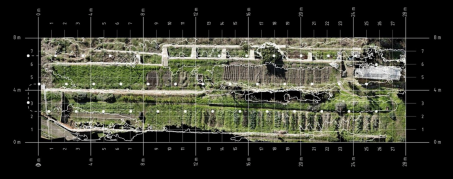Syllabus⇝
The course is an experienced-based engagement in management and implementation of an intensive organic agriculture farm. Whilst practical and hands-on, a general botanic theory will guide the development and investigation of agricultural and ecological systems and complex planting methods.
Traceability in nutrient flows, energy and labor costs will be mapped and recorded from farm to fork and from below ground to above ground. In this way we will measure the productivity of our farming experiences, making them measurable, comparable and ultimately demonstrate the viability of our interventions.
Over the centuries, the agricultural industrial sector has grown to become a force for ecological and climate change. Methods of landscape development for the production of food and material resources is now one of the most contested debates of our time. The ecological interactions seminar line, although mainly practical also examines what emerging techniques and infrastructure can be designed to be appropriate for climate resilient societies, productive enough for global markets whilst being ecologically regenerative rather than reductive. The Valldaura landscape and gardens offer a unique opportunity for innovation where tacit knowledge of plant and ecosystem development combined with new computational and digital tools to enhance knowledge and practice towards an ecological optimum for agricultural systems. The objective is for students and researchers to gain practical, hands-on experience of farm life. Part of the Valldaura living lab.
The classes will be held at the Valldaura Labs campus.
Learning Objectives⇝
The student will:
- Acquire an understanding of various historical and changing paradigms of farming, as well as their underlying philosophies and theories.
- Gain an experiential understanding of day-to-day farming activities, whilst recording tooling techniques, observations, and best practices.
- Monitor and record the varied flows of inputs and outputs, through both tacit knowledge, direct observation, and the use of digital monitoring equipment for traceability.
- Propose and record planting strategies for resilient agriculture and make hypotheses about polyculture planting, rotation schedules, their design, costs, and benefits. - To study the development of a single garden variety in relation to its physiological conditions in depth.
- Evaluate the impact of new technologies towards computational agriculture.
Faculty⇝

Jonathan Minchin studied Fine Arts and Design Craftsmanship and digital Fabrication. He attained BA in Architecture and a masters degree MSC in ‘International Cooperation, Sustainable Emergency Architecture’ in 2010. He is coordinator of the EU funded research project called ROMI (Robotics for Microfarms) and has spoken at the European Commission and British Parliament.
In this field he has worked on housing and development projects alongside ‘Habitat for Humanity’ in Costa Rica, ‘UNESCO’ in Cuba and with ‘Basic Initiative’ in Tunisia.
He has worked in conjunction with ‘UN-Habitat’ in Barcelona and holds a particular interest in appropriate technology, bioregional industries and agroecology. His professional career has focused on architectural and urban development projects with Architects Offices in both England and Spain and his writing on “Geographic referencing for Technology Transfer” was published in the book “Reflections on Development and Cooperation” in 2011. He took part in the Fab Academy, Bio Academy and Coordinated the Green Fab Lab and Valldaura campus between 2012 and 2017.
Jonathan has also worked on the on the DIYBio Barcelona project.
